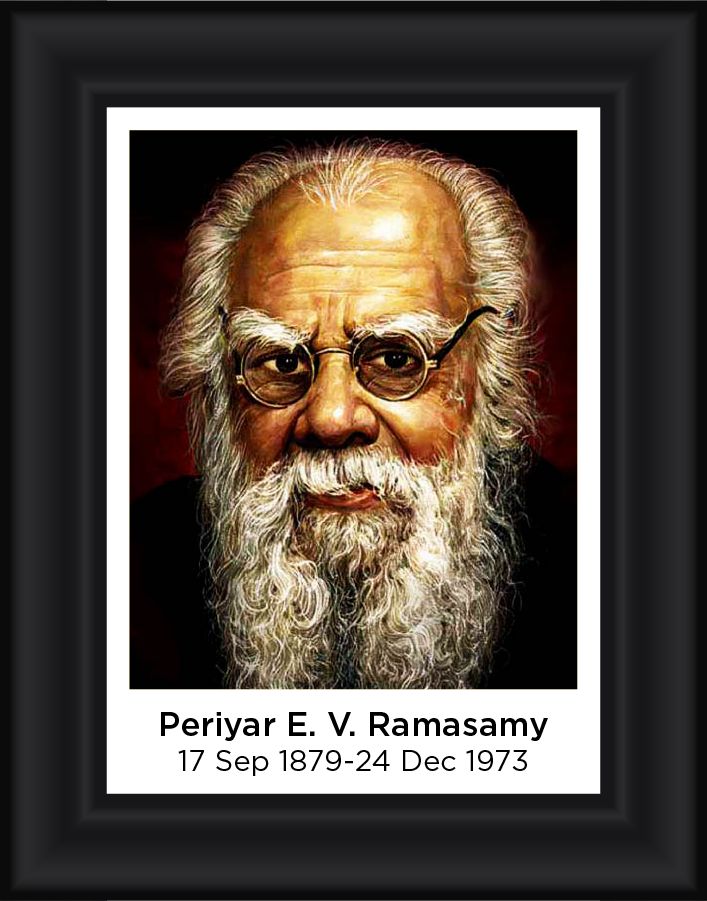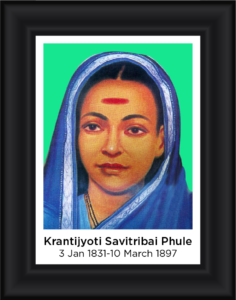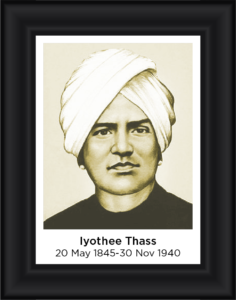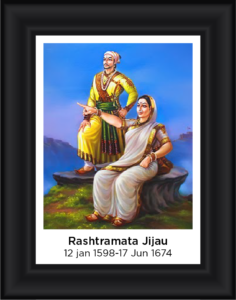Periyar E.V. Ramasami was born on 17th September 1879 and was known as the Voltaire (1694-1778) of South India, particularly, in Tamil Nadu. He aroused the people of TamilNadu to realise that all men are equal and it is the birthright of every individual to enjoy liberty, equality and fraternity. He opposed religion virulently because the so called men of religion invented ninths and superstitions to keep the innocent and ignorant people in darkness and to go on exploiting them. In one of his articles, Voltaire said They (the religious men) inspired you with false beliefs and made you fanatics so that they might be your masters. They made you superstitious, not that you might fear god but that you might fear them The “revolution” which Periyar brought about was a bloodless one and he had for spend more than fifty years of his life opening the eyes of People to their want of education-and consequent backwardness, their faith in superstitions, the deception and exploitation to which they are subjected by cunning people and also on the need for them to develop self-respect and self confidence.
It is interesting to note the Term ‘self-respect as used by Periyar includes the three concepts liberty, equality and fraternity which Voltaire and other French revolutionists exhorted their countrymen to acquire. Periyar repeatedly and feelingly spoke about Women’s liberation.
The great social Revolutioner
Periyar was born on 17th September 1879. His parents were deeply religious and they frequently arranged religious discourses to be given at a temple or in other Public places. While all the other mem¬bers of the family listened to the discourses with great devotion even in his early teens Ramasami displayed a keen rationalistic tendency and ridiculed the pun¬dits who gave the talks, by pointing out the contra¬dictions in their statements and also their incredible exaggerations. Referring to this early experience of his, Periyar wrote later in one of his autobiographi¬cal articles: It gave me extraordinary pleasure to fling at the pundits their own contradictions and Thus perplex Them. I believe that it was this experience which deprived me of faith in castes and communi¬ties, in religion, in “puranas”, in “sastras” and in god.
The enormous privileges given to Brahmins by the Vedas were sacrosanct only as long as they went unchallenged. The challenge rose in Tamil country like a whirlwind, spearheaded by an iconoclast who questioned the Vedas and the gods as well.
The untouchables were denied education, participation in social and governmental activity, and contact with other castes, except when their ser¬vices as scavengers, hide-flayers and cattle butchers were required. From questioning, Periyar moved to rebellion from the 1920s onwards. He once attempted to take a number of untouchables to a temple at Vaikom in Kerala, where they were not even allowed to enter the streets near the temple. This agitation was put down with a brutal hand by the Travancore police and Periyar was imprisoned. While in prison, he realised the futility of trying to reform the so called Hindu religion, or any religion for that matter, and decided that atheism, rationalism and free thinking were the only way forward. This meant, quite clearly, that religion would have to be consigned to the dustbin of history and that mankind would have to start afresh in a world where all men were really born equal, and lived in a genuine equality of opportunity. The rest of Periyar’s life would be spent campaigning against Hinduism and attempting to reduce the privileges the Brahminical castes had given them selves. With this in mind, he set up the Dravida Kazhagam, the world’s largest atheist organization, as a mass movement to propagate decency, to pioneer legislative changes to benefit all casteless Hin dus and to provide decent education to a people who had been denied the very right to study for centuries, so that they could work to achieve all that had been denied to their ancestors. Such a simple act as Periyar’s beating of an idol of Ganesha with slippers in the 1940s caused as much controversy as Diderot’s call in 8th century France, “Now let us strangle the last king with the intestines of the last priest.” The implementation of his ideals soon involved him in politics. Two months after the Indian Constitution took effect on 26 January 1950, the 1947 general order prescribing reservations (affirmative action) in the Madras presidency was challenged by Brahmins and struck down by a full bench of the Madras High Court. Periyar organised a full-scale agitation against this judgment. The state government appealed to the Supreme Court, but the appeal was struck down. Faced with this massive judicial assault on the frail foundations of social justice, Periyar organised a boycott of all Union Ministers. As a result, in 1951 then-Prime Minister Jawaharlal Nehru, Home Minister S. V. Patel, and Law Minister Dr. B. R Ambedkar brought about the First Amendment to the Indian Constitution to. safeguard the rights of discriminated caste Indians, of whom there were millions.
Periyar noticed that the Manusmriti and other Hindu scriptures ranked woman below all castes and even below animals. Her father owned her after birth, her husband after marriage, and her sons after wid owhood-if she was not burned alive by then. He advocated the unthinkable: widow remarriage, education for women, even abortion and sterilisation as a means of birth control. So far-reaching were his ideas that he suggested unisex dressing, common names for men and women, enlistment of women in he armed forces, even a dismantling of the institution of marriage, which put considerably more pres sure on women than on men. The Dravida Kazhagam has put its considerable weight behind working for women’s empowerment. It has, besides the first women’s engineering college in the world at Vallam, a polytechnic for women at Thanjavur, a teachers’ training college and a college of pharmacy at Tiruchirapalli, and an advanced computer center at Madras, accessed by the education departments of several universities. Also at Madras, but not exclusively for women, is a superb free coaching center for civil service aspirants. Part of the same family of institutions is “POWER”, which provides assistance to housewives’ industries to supplement their incomes, provides professional counseling to women having difficulties in their family lives, and helps divorced women to become fully self-supporting, Periyar devised a very simple, priestless marriage ceremony called the “self-respect marriage”. This involves a simple pledge made by the bride and groom followed by an exchange of garlands before their families. Instead of a vast banquet, the guests raise a collection of money that is given the couple to help them establish themselves in life. Such simple, practical approaches were characteristic of Periyar. His view of rationalism was that it should extend to every facet of life, instead of being a mere tool for academic research. In the 26 years.since Periyar passed away in 1973, the foundations he laid have become immensely strong, and the Dravida Kazhagam continues to grow. Periyar spent a life half anguished over the rituals that have come to occupy the bulk of our lives to the detriment of working for any advancement.” A few thoughts from his writings: “He who believes in god is a fool, he who worships god is a barbarian, he who propagates god is a scoundrel”
Why I am against Hinduism
(Discussion between Periyar Ramasami and M.K. Gandhi)
Periyar : Hinduism must be abolished!
MK.Gandhi : Why do you say so?
Periyar; There is no religion called ‘Hinduism’.
M.K.Gandhi : But, it is there !
Periyar : It is a concoction of the brahmins. They have persuaded the people to believe that it is a religion.
M.K.Gandhi : Can’t we say that all religions are what the people have imagined them to be?
Periyar : We can’t say that. For all other religions there is historical evidence. Further, all of them have principles acceptable to all the followers.
M.K.Gandhi : Doesn’t the Hindu religion have such principles ?
Periyar: What is there ? It was divided society into different groups like brahmins, sudras and declared that brahmins belong to a superior caste and all the others are lower caste people. This differentiation is the only achievement of this so-called religion. There is no supporting evidence for any of the claims made by the advocates of the religion.
M.K.Gandhi : O.K.! Hinduism has this principle at least!
Periyar : How is it useful to us ? By that principle brahmins alone belong to a high caste, you and I and all others are lower caste people !
M.K.Gandhi : Your statement is not correct. In Varnashrama Dharma there is no mention of higher and lower castes.
Periyar : You may be pleased to say so, but actual practice is different.
M.K.Gandhi : This can be practised.
Periyar : This cannot be practised as long as Hinuism is in vogue.
M.K.Gandhi : This ca be done only with the help of Hinduism.
Periyar : In that case, what happens to the division like brahmins and sudras made with religious support.
M.K.Gandhi : You-just now said that Hinduism has no support for class divisions.
Periyar : I say that there is no religion called Hinduism and therefore the supporting claims made in the name of religion for the division of the community into higher and lower castes, are not valid. But if we accept that there is a religion called Hinduism, then we may have to take into consideration the claims made in the name of religion.
M.K.Gandhi : We can accept the religion and we can formulate some principles to support its policies.
Periyar : That is impossible. If we accept the religion we can’t change anything with which it is linked.
M.K. Gandhi : What you say may apply to other religions but not to Hinduism. After accepting this religion, you can do anything in its name. Nobody can object to your actions.
Periyar : How can you say that ? Who will permit me to do anything in the name of religion ? Should I not be able to say which principle of this religion supports my action ?
M.K.Gandhi : What you say is true. There is no religion called Hinduism. I accept that I agree with you when you say that this religion has no fixed principles. That is why I say that we may admit that we are Hindus and then we can evolve principles for the religion. At the present day, in this country, why ? in the whole world, if we wish to make the people lead disciplined lives, we can do that only with the help of the Hindu religion. Other religions cannot help us in this matter because they are historically authentic and their principles are fixed and soundly supported. If we tamper with them, the followers of those religions will punish us Christians are bound to follow Christ’s words or what are presented in the Bible as Christ’s views.
Muslims must follow Mohammed Nabi’s words as presented in the Koran. If any change is suggested, that will be considered an irreligious action. One who wishes to make any such suggestion will have to come out of that religion and speak. Otherwise, he will be severely punished. This is the nature of all true religions. But, since Hinduism is not a religion anyone cane become recognised as a greatman in the name of this ‘religion’ and he can express his views as religious principles. In this way, many great men have expressed many of their ideas in the name of this religion. Therefore we too can introduce into it many reforms suited to the present day society.
Periyar : Excuse me ! That is impossible.
M.K Gandhi : Why?
Periyar : The selfish gang in Hinduism will not permit it at all.
M.K.Gandhi : How do you say that ? have not all people in this religion accepted that there is no untouchability in Hinduism ?
Periyar : Theoretical acceptance of any idea is one thing and following it in practice is another. Therefore it is not possible to introduce any reforms in Hinduism.
M.K.Gandhi : I am showing it in practice. Have you not realized how many changes have taken place during the past 4 or 5 years ?
Periyar : I do realize that changes appear to have taken place but they are not real changes. The people pretend to accept the reforms suggested by you because you are influ¬ential and because they need your good will. And you have taken their words on trust.
M.K.Gandhi : (smilingly) Who are you referring to?
Periyar: All the brahmins.
M.K.Gandhi : You mean all the brahmins ?
Periyar : Oh yes ! All the brahmins, including those who are with you.
M.K.Gandhi : In that case don’t you have faith in any brahmin ?
Periyar : I am not able to have faith in anyone.
M.K.Gandhi : Don’t you have faith even in Mr. Rajagopalachari ?
Peiryar : He is a good and truthful person. He is unselfish and self-sacrificing. All these good qualities come to the fore in his service to his community. But I cannot easily bring myself to entrust the welfare of my people – the non-brahmins – to him.
M.K.Gandhi : That is surprising to me. It is your view that there is not even one honest brahmin in the world ?
Periyar : Perhaps there may be a few, but I haven’t come across any such person.
M.K.Gandhi : Please don’t say so. I know a brahmin. I consider him an absolutely good brahmin, he is Gopal Krishna Gokhale.
Periyar : Oh, what a relief ! If such a great person like you have been able to find only one good brahmin, how can “sinners” like us come across any good brahmin ?
M.K.Gandhi : (laughing) The world will always be under the domination of the intelligentsia. The brahmins are educated and at all times they will be dominant. And there is no use of blaming them for that. Others also must come to that position.
Periyar : Hinduism is unlike other religions in one respect. In this religion all the brahmins are educated and they alone form the in telligentsia. Among the others, more than 90 percent are uneducated and gullible. In a society which follows a certain religion, if only one community can be educated and dominant, should we not consider that religion harmful to the people of other communities? That is why I say that Hinduism is a bad religion and that it should be abolished.
M.K.Gandhi : What exactly is your idea? Can I take it that you wish to abolish Hinduism and get-rid of brahmins ?
Periyar : If Hinduism, that is, the wrong kind of Hindu religion, is abolished, there won’t be any brahmins. It is because we have the Hindu religion, the brahmins are there and that too all powerfully and you and I are known as Sudras.
M.K.Gandhi : It is not so. Don’t the brahmins listen to my words ? Can’t all of us join together at this time and acting from within the religious fold, remove all that you consider to be defects in Hinduism?
Periyar: It is my humble view that you can’t do it. Even if you succeed in doing it, after you, another great man will come up, reverse all the changes you have made and leave the religion as we find it today.
M.K.Gandhi : How can he do that?
Periyar : Just now you said that people can be made to accept and follow whatever we say in the name of religion. Can’t a great man of the future do anything in the name of religion?
M.K.Gandhi : In the future, no one can easily change, religious practices, as we intend to do now.
Periyar : You must forgive me for what I say. Having Hinduism in vogue, you cannot effect any permanent changes. Brahmins won’t allow anybody to go so far. If they find that your ideas go against their in terests, immediately they will begin to oppose them.’ So far, no great person has made any kind of change. If any person tries to do it now, the brahmins will not allow him to have a free hand. M.K.Gandhi : You have formed a wrong impression of the brahmins in your mind. That is uppermost in your thoughts. I don’t think we have come to any agreement on anything that we have discussed so far. Still, we shall have two or three more meetings and then decide what we can do. (So saying, while still stretched in bed, he put his hand on his head and turned it slowly in a circle.) (Periyar-Gandhi Meeting in 1927, The Hindu Religion and Gandhiji and Periyar-Valluvar Publishing House, Bhavani, 1948)



